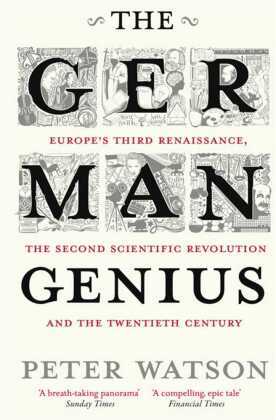The German Genius - Europe's Third Renaissance, the Second Scientific Revolution and the Twentieth Century
| Verlag | Simon & Schuster UK |
| Auflage | 2011 |
| Seiten | 992 |
| Format | 19,8 cm |
| Gewicht | 720 g |
| Artikeltyp | Englisches Buch |
| ISBN-10 | 1416526153 |
| EAN | 9781416526155 |
| Bestell-Nr | 41652615UA |
Eine faszinierende Kulturgeschichte der Deutschen von 1750 bis zur Gegenwart.
A virtuoso tour through the cultural history of German ideas and influence, from 1750 to the present01Peter Watson, geboren 1943, studierte an den Universitäten von Durham, London und Rom. Er war stellvertretender Herausgeber von "New Science" und arbeitete vier Jahre lang für die "Sunday Times". Er war Korrespondent in New York für die "Times" und schrieb für den "Observer", die "New York Times", "Punch" und "Spectator". Er hat bisher dreizehn Bücher veröffentlicht und war an einigen TV-Produktion zum Thema Kunst beteiligt. Seit 1989 ist er als Lehrbeauftragter am McDonald Institute for Archaeological Research der Universität Cambridge tätig.
From the end of the Baroque age and the death of Bach in 1750 to the rise of Hitler in 1933, Germany was transformed from a poor relation among western nations into a dominant intellectual and cultural force more influential than France, Britain, Italy, Holland, and the United States. In the early decades of the 20th century, German artists, writers, philosophers, scientists, and engineers were leading their freshly-unified country to new and undreamed of heights, and by 1933, they had won more Nobel prizes than anyone else and more than the British and Americans combined. But this genius was cut down in its prime with the rise and subsequent fall of Adolf Hitler and his fascist Third Reich-a legacy of evil that has overshadowed the nation's contributions ever since.
Yet how did the Germans achieve their pre-eminence beginning in the mid-18th century? In this fascinating cultural history, Peter Watson goes back through time to explore the origins of the German genius, how i t flourished and shaped our lives, and, most importantly, to reveal how it continues to shape our world. As he convincingly demonstarates, while we may hold other European cultures in higher esteem, it was German thinking-from Bach to Nietzsche to Freud-that actually shaped modern America and Britain in ways that resonate today.

